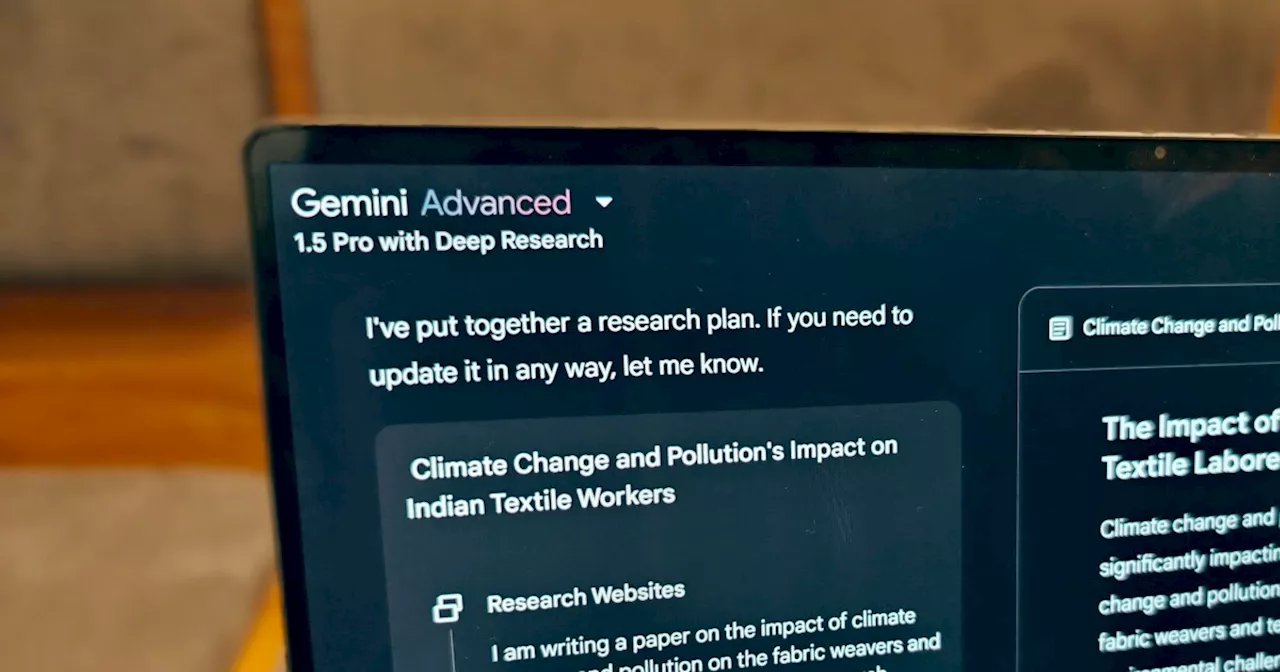Introducing Deep Research, the first agentic AI product in the Gemini family, revolutionizing how we search for information. Deep Research goes beyond traditional search engines by allowing users to specify their desired sources and crafting a multi-step search process. This eliminates the frustration of wading through irrelevant results and presents information in a clear, coherent manner. Deep Research's ability to synthesize information from various sources into a comprehensive report makes it a valuable tool for researchers, students, journalists, and anyone seeking reliable knowledge.
Ever since ChatGPT arrived on the scene, the hype around AI has only intensified. As talk of Artificial general intelligence (AGI) and “superintelligence” — yeah, OpenAI chief, Sam Altman, is now talking about that — heats up, we have another buzzword to deal with. Say hello to Agentic AI. In simpler terms, AI agents that are supposed to automate a chunk of our digital chores. Think of Gems in the Google lexicon. Custom GPTs by OpenAI. Or Copilot Actions by Microsoft.
The idea is to have an AI do your task, or some portion of it. Qualcomm and MediaTek have already prepped their silicon for the era of agentic AI. But here’s the problem. We don’t have a true agentic AI tool yet. We’ve barely crawled past the inquiry-response transaction flow that most generative AI chatbots offer. Enter Deep Research, the first agentic AI product in the Gemini family. A fundamental rethinking of search on the internet As the name makes abundantly clear, Deep Research is good at research, but in a much more controlled fashion than an average Google Search. With Deep Research, you can lay out the outline for the search quest before the process begins. You can specify the exact sources (or kind of sources) to get the results. That’s fundamentally different from Google Search, which mostly responds to keywords clubbed together, and shows results that it deems are worthy of a look. That’s a fundamentally flawed approach, and we often end up in a cesspool of clickbait or AI-generated jargon. Plus, Google’s random changes to its search algorithm often mean the search results for the same query may look different a day, or week, later. Deep Research pulls up material from a controlled and user-specified knowledge bank. So, let’s say you are trying to find information about the impact of social media on the mental health of young users, but only from peer-reviewed research papers. The results would stick to scientific papers only. For journalists, students, researchers, or even businesspeople, this approach saves a lot of time. More importantly, it doesn’t put the onus of trusting a source on the user. You already are familiar with the source, or its veracity, so the material you get doesn’t come with a trust conundrum. Moreover, the chore of skipping past the bad, non-desirable search results or ads is simply non-existent in Deep Research — at least right now. Deep Research essentially drafts a multi-step search activity, finds the information on your behalf, and repeats the process as the “search agent” moves from one source to the next, hunting for a new piece of relevant information. Essentially, it saves you the drudgery of running into the same information as you jump between different search results, in hopes of finding the wisdom you seek. In a nutshell, the time-consuming and psychologically infuriating parts of a Google Search are avoided. That’s not even the nicest part about Deep Research. Helpful, in just the precise way Researching and finding information from credible sources is only one-half of the picture here. Deep Research takes the pain point of clicking back and forth between different search result entries, or opening a few dozen tabs. Dealing with a bunch of tabs on a large screen is already a hassle for multiple reasons. The most important of them all is the hunt for that exact nugget of information embedded within a wall of text, video, or audio. Deep Research not only pulls up reliable information from the sources you’ve cherrypicked, but it also presents all those findings in a non-repetitive, coherent fashion. Just what you want, from the sources you seek. Now, unless your search task involves a single-step reference on the internet, you have to break the process into multiple steps. So, let’s say you want to learn about the art of mushroom farming. You would ideally look up information about the seed varieties, weather conditions, pest mitigation, and diseases — separately. It’s hard to find a definitive guide, especially one pulled from reliable sources. Deep Research does just that for you. All the information that it has crawled across the web to gather, will be presented in the form of a neatly-curated article, with appropriate headlines, tables, and categorical breakdown. It is the kind of search report that would otherwise take you hours to internalize and flesh out in the form of a document. For anyone who is in the profession of referencing and memorizing knowledge on a daily basis, this tool is a lifesaver. Take for example this search query: I am writing a paper on the application and differences between NMP and LFP batteries in the context of electronic vehicles and fire hazards due to battery. Pull up details from research papers and reputed agencies only. Help me understand and clarify the subject. What I got after roughly 2-3 minutes of research was a comprehensive draft, the way I would write a thesis, legal brief, or research pape
AI Agentic AI Deep Research Search Engine Information Retrieval Research Tools Gemini Natural Language Processing
United States Latest News, United States Headlines
Similar News:You can also read news stories similar to this one that we have collected from other news sources.
 Google Deep Research: AI Takes on Your Web ResearchGoogle introduces Deep Research, an AI-powered tool that allows Gemini AI to conduct in-depth research on any topic. Users provide a prompt, review and refine a research plan, and then receive a comprehensive report with sources.
Google Deep Research: AI Takes on Your Web ResearchGoogle introduces Deep Research, an AI-powered tool that allows Gemini AI to conduct in-depth research on any topic. Users provide a prompt, review and refine a research plan, and then receive a comprehensive report with sources.
Read more »
 Snow Could Be a Game Changer for Eagles in Divisional Round Playoff GameThe Eagles are preparing for potential snow in their divisional playoff game against the Rams, drawing comparisons to the historic 2013 Snow Bowl. The team's running game and offensive line are expected to be key assets in snowy conditions, while players are also taking steps to adapt to the potential challenges posed by slippery field conditions.
Snow Could Be a Game Changer for Eagles in Divisional Round Playoff GameThe Eagles are preparing for potential snow in their divisional playoff game against the Rams, drawing comparisons to the historic 2013 Snow Bowl. The team's running game and offensive line are expected to be key assets in snowy conditions, while players are also taking steps to adapt to the potential challenges posed by slippery field conditions.
Read more »
 Xbox Game Pass Users Praise New Free Game: “Best Game I’ve Played This Year”Xbox Game Pass subscribers were recently treated to a major new release, and it is proving to be a big hit with subscribers.
Xbox Game Pass Users Praise New Free Game: “Best Game I’ve Played This Year”Xbox Game Pass subscribers were recently treated to a major new release, and it is proving to be a big hit with subscribers.
Read more »
 Packers Lose to Eagles: Keys to Game, Play of Game, Player of GameThe Green Bay Packers were eliminated from the playoffs by the Philadelphia Eagles on Sunday. Here’s a look at what happened and a glimpse at what’s ahead.
Packers Lose to Eagles: Keys to Game, Play of Game, Player of GameThe Green Bay Packers were eliminated from the playoffs by the Philadelphia Eagles on Sunday. Here’s a look at what happened and a glimpse at what’s ahead.
Read more »
 Cast of 'September 5th' Dive Deep into Research for Olympic Tragedy FilmThe cast of 'September 5th,' a film about the 1972 Munich Olympics massacre, highlight their extensive research and emotional investment in portraying the real-life tragedy. Benesch explored the experience of translators during the hostage crisis while Sarsgaard delved into the life of Roone Arledge, the ABC Sports president who oversaw the network's coverage.
Cast of 'September 5th' Dive Deep into Research for Olympic Tragedy FilmThe cast of 'September 5th,' a film about the 1972 Munich Olympics massacre, highlight their extensive research and emotional investment in portraying the real-life tragedy. Benesch explored the experience of translators during the hostage crisis while Sarsgaard delved into the life of Roone Arledge, the ABC Sports president who oversaw the network's coverage.
Read more »
 LLM Research in the Classroom: Insights from MIT Deep Learning ClassThis article explores the latest developments in Large Language Model (LLM) research as presented by industry experts in an MIT Deep Learning class. It highlights key concepts such as parameter efficiency, context window importance, prompt engineering, and the potential of LLMs in various domains.
LLM Research in the Classroom: Insights from MIT Deep Learning ClassThis article explores the latest developments in Large Language Model (LLM) research as presented by industry experts in an MIT Deep Learning class. It highlights key concepts such as parameter efficiency, context window importance, prompt engineering, and the potential of LLMs in various domains.
Read more »
